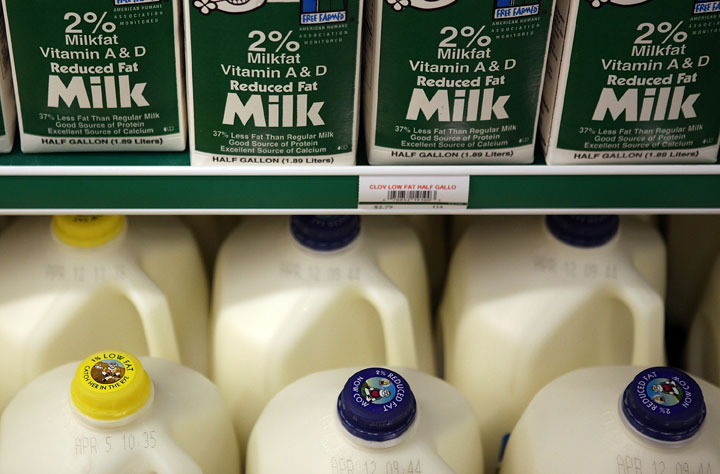TORONTO – Our mothers may have always told us to drink our daily glass of milk to keep our growing bones healthy and teeth strong, but now one study says they were wrong.

Swedish researchers say that consuming more milk – about three or more glasses per day – may be increasing your risk of bone fractures and even early death.
It’s not the first time scientists have cast doubt on milk and its status as the holy grail of childhood nutrition.
This time around, Uppsala University researchers looked at the dietary habits of more than 45,000 men for over a decade and more than 65,000 women for up to 20 years.
They zeroed in on how much and what types of milk and dairy the study subjects were eating. Hip fractures and other bone fractures were also logged over the years.
READ MORE: Is milk our healthiest, best source for calcium?
What was unsettling was that women who consumed three glasses of milk per day had higher risk of fracturing their bones and a higher risk of death. Their risk of death and heart disease doubled along with a nearly 44 per cent increased risk of cancer compared to their peers who weren’t drinking as much milk, according to reports.
If women drank three or more glasses of milk per day, their risk of death also increased slightly compared to their counterparts who had a single glass per day.
- Capital gains changes are ‘really fair,’ Freeland says, as doctors cry foul
- Ontario doctors offer solutions to help address shortage of family physicians
- ‘Dangerous message’: Experts slam anti-sunscreen claims circulating online
- ‘Trying not to die’: Tourism operators loaded with debt despite rising demand
“I’ve looked at fractures during the last 25 years. I’ve been puzzled by the question because there has again and again been a tendency of a higher risk of fracture with a higher intake of milk,” the study’s lead author, Dr. Karl Michaelsson, told the Washington Post.
“The study findings have, for myself, been strong enough to cut down on my milk consumption,” Michaelsson told the New York Daily News.
But Michaelsson notes that milk was tied to higher levels of oxidative stress, described as a biological stress marker. It’s been linked to cancer and heart disease.
For some reason, cheese and yogurt didn’t yield the same results.
The research shouldn’t scare away consumers from getting their daily dose of calcium, though. Milk is traditionally thought to offer plenty of benefits – vitamin D, calcium and protein, for starters.
READ MORE: How much calcium is too much?
Last year, Harvard University professor and pediatrician Dr. David Ludwig spoke out against milk, suggesting that it may be adding to the obesity epidemic.
Ludwig suggests the non-fat variety is like other low-calorie options, like fat-free snacks or artificially sweetened drinks – research has pointed to a link in eating more when dining on these “healthier” options.
Zero, one and two per cent fat milk options don’t offer satiety the same way full-fat milk does. Ludwig suggests that if kids drink non-fat milk, they might reach for extra cookies to compensate while those who sip on full-fat milk may find their drinks more satisfying.
Low-fat milk is also high in sugar. One cup of two per cent milk contains 12.3 grams of sugar, which is more than what’s in a Reese’s Peanut Butter Cup.
Canadian doctors had their own questions about Ludwig’s review but agreed that for some of us, there are better ways of getting our calcium and vitamins.
But for kids, milk may be a parent’s best bet to making sure their growing bodies get the calories and nutrition they need.
READ MORE: Should you be taking a daily vitamin C pill?
“We can easily survive without milk in our diet and we can provide children with a diet that excludes milk. The key point is that it is hard to do that,” Dr. Rena Mendelson, a nutrition professor at Ryerson University, told Global News.
“You can get calcium from things like broccoli or kale but you’d have to eat a lot of it and it’s not food children easily accept,” she said.
Dr. Ali Zenter, a Vancouver-based doctor and obesity expert, suggests that drinking calories isn’t ideal either.
A glass of fat-free skim milk has 91 calories and a glass of full fat milk has 157 calories and 8.6 grams of fat.
“The fascinating thing about drinking your calories is that there are studies that show that drinking calories doesn’t cause satiety as well as eating them,” Zentner said.
carmen.chai@globalnews.ca
Follow @Carmen_Chai




Comments